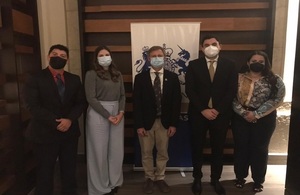Setting expectations of the Taliban
Explanation of Vote by Ambassador Barbara Woodward on the Security Council resolution on Afghanistan
Thank you, Mr President. Today this Council has spoken clearly on the situation in Afghanistan and set out its minimum expectations of the Taliban.
The immediate priority is ensuring that all those who wish to leave Afghanistan can do so safely. We have been clear that the Taliban must adhere to their own stated commitments to ensure safe passage, beyond 31 August.
Second, Afghanistan can never again become a safe haven for terrorists. We have condemned unequivocally the attack on Kabul airport last week, and we reiterate our condolences and sympathy to the bereaved and to the injured. A coordinated approach will be vital to counter any extremist threat emanating from Afghanistan, and we call on the Taliban to uphold the commitments contained in the Doha agreement.
Third, the humanitarian situation requires urgent attention. We are coordinating closely with partners to strengthen efforts to support humanitarian assistance and ensure unimpeded access for humanitarian workers and organisations.
Finally, the gains of the last 20 years must be protected, and human rights, including those of women and children and minorities, safeguarded. This resolution lays down a marker that the international community will be watching closely.
Today’s resolution is an important step towards a unified international response to the situation in Afghanistan. We will continue to build on this to ensure the Council holds the Taliban accountable on its commitments. The Taliban will be judged the international community on the basis of their actions on the ground, not their words.
Thank you, Mr President.

